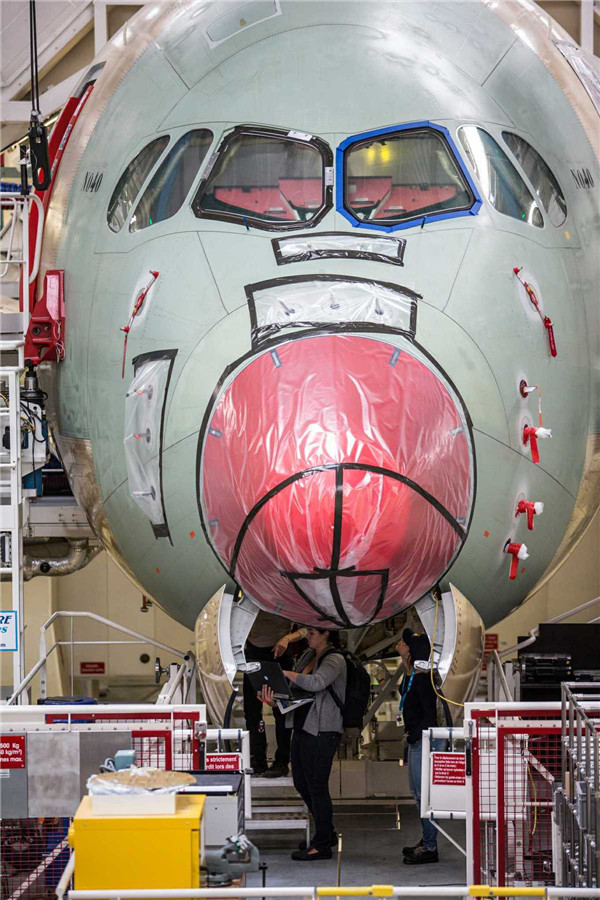First mainland airline to get new A350 by year-end

European aircraft manufacturer Airbus SE said it plans to deliver the first of its new A350 widebody plane to a Chinese mainland carrier by the end of the year, and it is bullish on the nation's demand for widebody aircraft, fueled by fast-growing long-haul international routes.
Hong Kong Airlines currently operates four A350s, and Cathay Pacific Airlines received its first A350-1000 on Wednesday, among its 20 orders. No carriers from the Chinese mainland operate the A350, the latest widebody aircraft of Airbus.
So far, Airbus netted 50 orders of A350 from Chinese mainland carriers. It received 10 orders from Air China, 20 orders from China Eastern Airlines, and another 20 orders from China Southern Airlines. Worldwide, it has received 847 orders from 44 airlines.
"It has been undecided which Chinese mainland airline will get the first A350, and it would depend on the specific demand of airlines," said Hu Qin, marketing manager of Airbus China.
"The A350-900 model can fly as long as 19 hours, and it can help airlines further extend their flight networks and support extra long-haul routes, such as direct flights between China and Latin America," he said.
The fuel efficiency of the A350 aircraft is 25 percent higher than its peers, and its carbon emission would be 25 percent lower than the competitors, Airbus said.
Eric Chen, Airbus China president, said the robust growth of international flights from China, especially long-haul routes, has created a high demand for widebody aircraft. He said Airbus has been in discussion with Chinese industry players about expanding their cooperation on widebody aircraft.
In the next two decades, the global market will need about 3,000 to 4,000 medium and large widebody aircraft, and China's widebody fleet will require 1,670 new airplanes over the period, according to a forecast by Boeing Co.
Harbin Hafei Airbus Composite Manufacturing Center, a joint venture between Airbus and its Chinese industrial partners, is playing an important role in the global supply chain for the European group by producing composite material components for A350 planes.
Airbus manufactures 5 percent of the A350's airframe in China, and Chinese engineers also participated in its initial design work. Hafei's plant is responsible for manufacturing and assembling complete sets of elevators, rudders and other midsection A350 parts.
"Chinese aviation industrial players are responsible for more significant manufacturing jobs, such as producing composite material components for global aircraft manufacturers. This showed that they have become more skilled and recognized," said Lin Zhijie, an aviation industry analyst and columnist at carnoc.com, one of China's biggest civil aviation websites.

Employees work inside the front landing gear doors of an Airbus A350 XWB passenger aircraft on the final assembly line at the Airbus Group NV factory in Toulouse, France. [Photo/Agencies]
MOST POPULAR
- 1 China to give visa-free treatment to another 9 countries
- 2 China fully opens manufacturing sector to foreign investors in landmark opening up move
- 3 China's import expo attracts record-breaking participating countries, exhibitors
- 4 China's door opening even wider to foreign visitors, businesses
- 5 China revises rules to ease foreign strategic investment in listed firms
Editors' Picks
 Video:
Peru sees new port open
Video:
Peru sees new port open
 Infographic:
China's public holidays for 2025
Infographic:
China's public holidays for 2025
 Infographic:
Basic facts of APEC
Infographic:
Basic facts of APEC
 Infographic:
Wrapping up the 7th CIIE: Data recap
Infographic:
Wrapping up the 7th CIIE: Data recap



